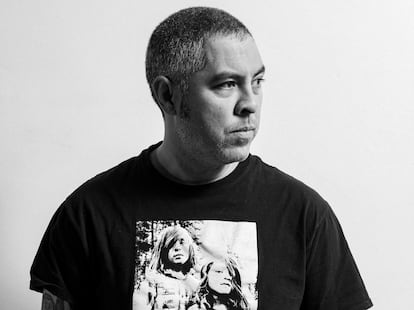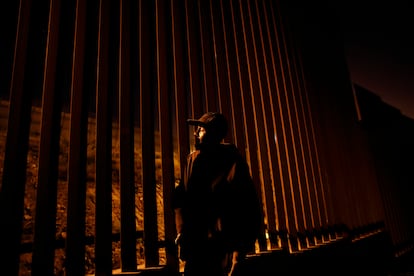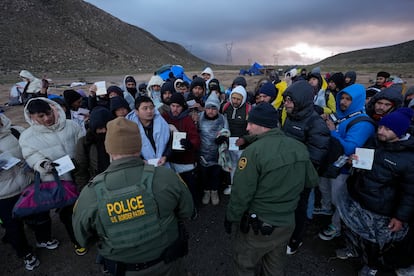Jason de León: ‘There hasn’t been a Black Lives Matter moment for immigration. Trump could push it’
The researcher and author, an expert on migration, discusses the debate surrounding this critical election issue and believes we are approaching a moment of reckoning

Movement and borders were always present in the life of Jason de León, 47, but they never really caught his attention. The son of a Filipino immigrant and a Mexican immigrant, both members of the U.S. Army, De León traveled extensively in his childhood between military bases, but mostly grew up in the Rio Grande Valley in Texas and in Long Beach, California. He crossed the border into Mexico countless times, and many of his family members were undocumented. But it wasn’t until he finished a college degree in archaeology that he developed an interest that would lead to nearly two decades of in-depth research on migration. Working on archaeological sites in Mexico, he began talking to men and women who had recently been deported or were planning to cross the border soon, and the Olmecs were quickly forgotten.
Since then, all of his work has been oriented towards researching immigration. He is Professor of Anthropology and Chicano Studies at the University of California Los Angeles (UCLA), Executive Director of the Undocumented Migration Project (UMP) — which studies clandestine migration between Latin America and the United States using a combination of ethnographic, visual, archaeological and forensic approaches to understand this violent social process — and author of two books on migration, The Land of Open Graves: Living and Dying on the Migrant Trail and Soldiers and Kings: Survival and Hope in the World of Human Smuggling, which was published this year.
Question. Given the recent evolution of the immigration narrative, how do you view the upcoming U.S. election?
Answer. There is the worry that if Trump gets reelected, that things are going to get a lot worse, that now this thing will become totally unhinged. At the same time, it’s always been like this in some way, shape, or form. And I feel like Trump is just a manifestation of many of the things around immigration that get said behind closed doors but are kind of hidden. It’s just that depending on who’s in office, they’re better at hiding it. If I had to put a positive spin on it, it might be the thing that finally breaks the camel’s back and makes people go, “this is unacceptable.” We had our Black Lives Matter moment, we haven’t really had an immigration moment. Trump could be the person that pushes us in that direction, to then force more difficult, but I would hope more productive, conversations. I’d be mortified for him to get reelected, but I have two small kids at home, and so part of my job I think is just trying to be as positive as I can.

Q. How has the Democratic Party adapted to this now seemingly prevalent narrative on migration?
A. I think the Democrats are hypocrites. They went from promising comprehensive reform, promising us an alternative to Trump, but then [Joe] Biden gets elected and none of those things happen. And now, as much as I want Kamala Harris to win, there’s a lot of pandering to the right: now suddenly we’re really tough on immigration. But as long as you don’t say “I’m going to shoot immigrants in the street,” anything is going to seem reasonable and kind of pro-immigrant.
Q. Yet even within Latino communities, who are directly impacted by the rhetoric and its consequences, a genuinely pro-immigrant narrative doesn’t seem to resonate...
A. I think part of it is that Latinos are tired of being defined by immigration. It is a reflection of this assimilation, of generations of people now who have less and less of a connection to the home country. People are like, what about the economy? What about global warming? What about all this other stuff? Another part of the problem is that they’re not doing a good job of speaking to those people. We’re all sick of the border stories, we’re all sick of migration stories.
Q. You’ve told those border stories yourself, what is the best way of telling them?
A. I think it’s difficult because there are so many out there, we are completely saturated. We don’t need another book about the U.S.-Mexico border. We don’t need another book about the plight of the migrants, at least not books that are the same story with different people. And so the trick is to tell it in a new way that gets you to think about it in an interesting way. But also trying to tell stories about people that just happen to be migrants, just happen to be crossing the border. The struggles that they have or the experiences they have are much more universal. So someone can pick up the story and say “this is a story about the working class,” “this is a story about being powerless.” For me, focusing on smugglers was, like, “what happens if I commit as much time and energy to telling the stories of these people who are always dehumanized?” Starting from the point of saying, “I’m here to just fully recognize that these are human beings who are not wholly defined by what they do, but are part of this much bigger system.” People want a black and white story. And that’s usually what the migration stories are reported as: good migrants, bad border patrol, or the other way around. And for me, it’s like this whole thing is gray.

Q. In that grayness, what have you found undocumented migrants and guides or smugglers have in common?
A. I think there’s this assumption that smugglers are just doing bad stuff to people all the time. But if that was the case, they would cease to exist, right? People don’t really think about them as service providers, which is, I think, what they are. It might be brutal, and it might be unpleasant and expensive, but those people are providing a service and that’s how they stay in business. The other misconception is that people who do that job are somehow rich kingpins. Really, it’s just like a mom-and-pop operation. I would say the majority of them are failed migrants, and they are worse off than the people that they are providing services for. If we were to talk about undocumented migration and the smuggling industry and its connections to all kinds of economies, I think people would have a better understanding that this is a global business. It is driven by capitalism, by things like climate change, by political instability. I want the American public to realize that we are responsible for fueling this whole industry, and that they’re coming here to make my food and all these services that I seek out relatively inexpensive.
Q. What have you actually seen on the ground along the migratory routes?
A. Smuggling up until around 2014 was pretty informal. When all of these Central American kids, especially from Honduras, start showing up at the U.S.-Mexico border, the U.S. says to Mexico, make it stop. So they start stopping these flows, and then the cartels realize they can really formalize their taxation. Now there are these low-level smugglers who are failed migrants who all have gang associations, but who are incredibly expendable. On top, transnational gangs, like MS 13, control these migrant trails. And then they have to pay up to different cartels who own these different plazas all across the country. It used to be that there were no quotas for migrants crossing Mexico until you got to the northern border. And now there are quotas all over the place. I think that really signals that the cartels understand that this is easy money.
Q. Mass deportation is looming large. What do you think about Trump’s key election promise?
A. If Trump gets elected, and they try this move, I think, politically, there are a lot of roadblocks that can be put up. But also to put someone in the White House who wants to do stuff like this, it’s going to radicalize the left in ways that we’ve never seen. I don’t think that half of the American public is going to sit by idly and watch their family, their neighbors, their friends, their coworkers be deported. I don’t necessarily want it to get to that because I think that comes with a lot of other things. But you’re about to see how far you can push people before they stand up to these incredible injustices.

Sign up for our weekly newsletter to get more English-language news coverage from EL PAÍS USA Edition
Tu suscripción se está usando en otro dispositivo
¿Quieres añadir otro usuario a tu suscripción?
Si continúas leyendo en este dispositivo, no se podrá leer en el otro.
FlechaTu suscripción se está usando en otro dispositivo y solo puedes acceder a EL PAÍS desde un dispositivo a la vez.
Si quieres compartir tu cuenta, cambia tu suscripción a la modalidad Premium, así podrás añadir otro usuario. Cada uno accederá con su propia cuenta de email, lo que os permitirá personalizar vuestra experiencia en EL PAÍS.
¿Tienes una suscripción de empresa? Accede aquí para contratar más cuentas.
En el caso de no saber quién está usando tu cuenta, te recomendamos cambiar tu contraseña aquí.
Si decides continuar compartiendo tu cuenta, este mensaje se mostrará en tu dispositivo y en el de la otra persona que está usando tu cuenta de forma indefinida, afectando a tu experiencia de lectura. Puedes consultar aquí los términos y condiciones de la suscripción digital.









































